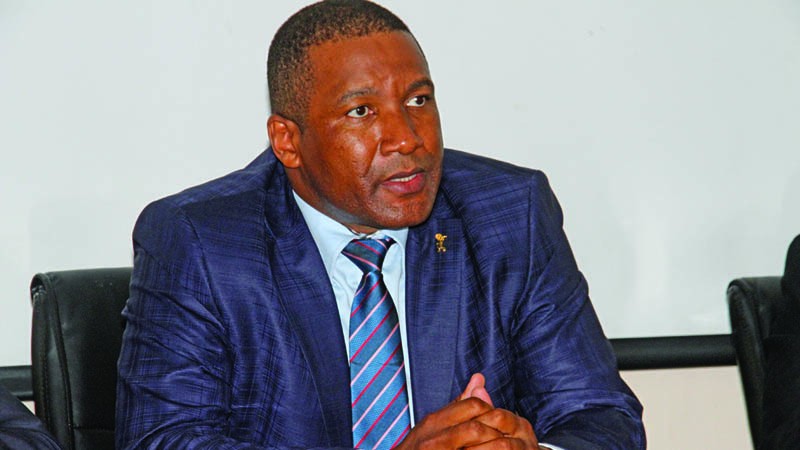Parliament poorly resourced
Baboki Kayawe | Thursday April 13, 2017 14:51


Boko, together with other legislators who on Tuesday attended a workshop on strengthening the role of Parliament in the promotion and protection of social and economic and cultural rights, bemoaned the limited capacity of Parliament in the form of constrained resources, thereby hindering its effective oversight function.
Moreover, he said ensuring and upholding human rights was the primary responsibility of any Government. He added that they (rights) cannot be delivered in the form of gifts and freebies from Government. “Human rights are not political artifects or favours to the people. It’s Government’s responsibility to ensure that health, education and other rights are met. If a Government fails to do this, it has lost the basic reason for existence as a Government,” he said, adding that the above is the case with the current regime, characterised by vast inequalities, which he said would soon evoke civil disobedience as in the case of neighbouring South Africa.
“Southern Africa is characterised by skewed distribution of resources and income and the majority of the people is excluded from accessing land and controlling the economy,” Thabileng Mothabi from Amnesty International Southern Africa office said.
Mothabi who was also in attendance implored legislators to deal with these vast inequalities, as well as review laws that allow conglomerates to benefit from the region’s resources, especially in the mining sector.
He called on Botswana to domesticate the Africa Mining Vision as well as align it to policy and accelerate implementation. The vision provides the roadmap for implementing the Africa Mining Vision in the future. Member of Parliament for Gabane/Mankgodi, Pius Mokgware said lack of information and other necessary tools were making it hard for legislators to hold powers accountable. “It is even more difficult for an opposition MP to access government information you are told it can’t happen for security reasons,” he said. This, Mokgware said, made it difficult for the state to be held accountable. He added that there was no law empowering MPs to look into the financials and operations of mining companies based in the country, meant there was no monitory mechanisms to ensure that the rights of locals are protected.
“Last week Parliament passed a tax regime law that gave mining companies more relief than us,” Mokgware said. The amendment to the Income Tax Act passed by Parliament last week, will allow some mines to transition to the lower corporate tax rate of 22%, from the higher rates contained in their original tax agreements with government. The original agreements were crafted years ago as an incentive package for mining investments, but had since become costly as the corporate tax rate declined over the years.
Mokgware further said the build-up to the BCL Mine closure was characterised by poor housing, adding, “Marikana results are not far from happening here”. Programmes manager of the SADC Parliamentary Forum (PF), Sheuneni Kurusha said the issue of Parliaments and human rights is relevant and timely as there is growing consensus globally that enhancing the role of parliaments in the protection and realisation of human rights is an idea whose time has come.
“This calls for parliaments to develop the institutional structures, processes and mechanisms necessary to put human rights at the centre of their core functions,” he said.
Kurusha added the meeting came at the back of the 39th Plenary Assembly Session of SADC PF that was held in Swaziland in June 2016, under the theme ‘Strengthening Parliament’s Role in the Protection and Realisation of Human Rights in Southern Africa’. The session reiterated that human rights are indigenous to Southern Africa, as they lie at the core of the aspirations and struggles of the peoples of the region throughout history.
“Our fight for self rule during colonial oppression attests to our collective desire for human dignity and good governance, which are key tenets of human rights,” he added. With regards to the social, economic and cultural rights, the 39th Plenary Assembly observed that post-independence states in the SADC region are characterised by contradictions of a developed and diversified formal economy on one hand, existing alongside an underdeveloped peasant-based subsistence rural economy, he said. This has resulted in acute inequalities, which manifest, among others, through unequal access to social services, especially health, education, water, sanitation and food. The inequalities have also resulted in excessively high poverty levels of up to 90% in some instances. In view of the above state of affairs, Kurusha said the 39th Plenary Assembly Session underscored the central role of parliaments in the protection, promotion and fulfilment of human rights.
“It accordingly, resolved that priority must be given to building the knowledge and capacities of parliamentarians in human rights discourse in order to make them more effective in discharging their mandate in this regard,” he said.
